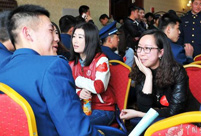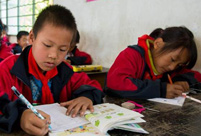 'Model husband' shatters image of love
'Model husband' shatters image of love
 Can animals smile? Or put on a happy face
Can animals smile? Or put on a happy face
 Geng Xuan crowned at 9th China Super Model Contest
Geng Xuan crowned at 9th China Super Model Contest
 Top 10 billionaires in the liquor industry
Top 10 billionaires in the liquor industry
 Backstage at China Fashion Week
Backstage at China Fashion Week
 Ballerinas anywhere but onstage
Ballerinas anywhere but onstage
 Top 10 safest airlines in the world
Top 10 safest airlines in the world
 Posters of 33rd HK Film Awards unveiled
Posters of 33rd HK Film Awards unveiled
 Top 10 most popular instant messaging apps in the world
Top 10 most popular instant messaging apps in the world
 Inspiring shadow images of Chinese army
Inspiring shadow images of Chinese army
Negotiations on the Regional Comprehensive Economic Partnership (RCEP) are facing challenges, despite concrete progress in previous rounds, an RCEP official said here on Friday.
The fourth round of talks in south China's Guangxi from Monday to Friday came only two months after the third round in Malaysia in January.
"Although the past three sessions achieved concrete progress in tariff concessions, customs procedures, trade facilitation and rules management, challenges still lie ahead," said Iman Pambagyo, the Association of Southeast Asian Nations (ASEAN) chairman of the RCEP negotiation committee.
Thorny issues do not only concern countries directly involved in the negotiations, but other free trade agreements in the Asia-Pacific Region.
"Countries may have different ideas on how to reduce tariffs and to what extent to make concessions. Partner countries find it hard to agree a fair tariff concessions between themselves," says Iman Pambagyo.
"Since economic development and trade liberalization in RCEP countries are at different stages, we cannot expect to integrate so many discrepant bilateral agreements in one go," he said. The Trans-Pacific Partnership Agreement (TPP) and China-Japan-South Korea Free Trade Agreement are particularly difficult to integrate.
After the United States joined the TPP in 2011, Japan become a partner country in 2013. "It shows that Asia's power fundamentally changed its stance," he says.
Several experts believe Japan is the first of many countries in the region now seriously considering joining the TPP, as the U.S.-Japan alliance expands from the traditional political and security areas to economic issues. The Republic of Korea, the Philippines and Thailand have all shown interest in joining the TPP.
"The RCEP cannot avoid the region's other free trade agreements," a senior representative from Australia said. "Bilateral free trade agreements already existed between ASEAN countries, and other six partner countries of the RCEP need to become an integral part of RCEP talks."
CHINA'S ROLE
The agreement needs to cater to the differences between 16 countries and provide special policies for the least developed members of ASEAN.
Xu Ningning, executive president of the China-ASEAN business council, said service trade sector has great potential. "Service liberalization is sensitive for every nation. Once agreements are reached in this area, the overall accomplishments of negotiations can be expected," he says.
It is a test for China's relatively conservative service industry. China has only opened up 33 service sectors to ASEAN, while Japan and New Zealand have promised 164 and 116, respectively.
Premier Li Keqiang expressed China's willingness to push forward RCEP talks in cooperation with ASEAN during his visit to Brunei last year.
Chinese delegation leader Wang Shouwen, assistant minister of commerce, said China will promote RCEP talks in order to accomplish its own strategic planning of free trade agreements.
The first round was held in May last year after the start of negotiations was declared in November 2012. Negotiations currently involve 16 countries, including China, Japan, Australia, New Zealand, India and all 10 ASEAN members.
During the previous three rounds of talks, seven working groups were established for detailed cooperation. The groups cover goods trade, service, investment, economic and technological cooperation, intellectual property rights, competition policies and dispute settlement.
Wang said at the start of the five-day meeting that trade development within the East Asia region had gathered great momentum. The growth rate of China-RCEP countries' bilateral trade has already surpassed the average growth rate of China's foreign trade, he said.
If signed, the RCEP will create one of the world's largest economic blocs as the 16 countries together account for about 45 percent of the global population and over 30 percent of the world's gross domestic product.
"If the talks accomplish what RCEP was proposed for, its partner countries will have a much freer trade and investment environment compared with the bilateral free trade agreements between ASEAN and the other six countries," says Xu Ningning.
 Wonderful moment of China's airborne forces
Wonderful moment of China's airborne forces Bai Baihe shoots for fashion magazine
Bai Baihe shoots for fashion magazine Red terraced fields in Dongchuan of Yunnan
Red terraced fields in Dongchuan of Yunnan Jiaju Tibetan Village
Jiaju Tibetan Village Spring dating
Spring dating Confucius institute at UC Davis
Confucius institute at UC Davis Little painted faces at temple fair
Little painted faces at temple fair Top 10 safest airlines in the world
Top 10 safest airlines in the world Foreign students at China-Myanmar border
Foreign students at China-Myanmar border The backstage of the Fashion Week
The backstage of the Fashion Week College students in Han costumes
College students in Han costumes Postgraduate works as waitress
Postgraduate works as waitress Life in a Lahu village in Yunnan
Life in a Lahu village in Yunnan An orphan’s wedding
An orphan’s wedding Hollywood documentary brings Diaoyu Islands truth to new audience
Hollywood documentary brings Diaoyu Islands truth to new audienceDay|Week|Month